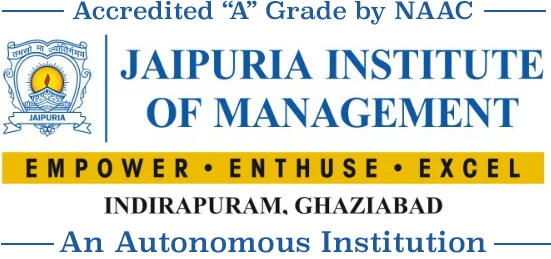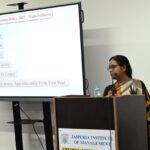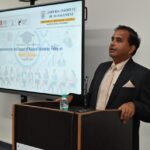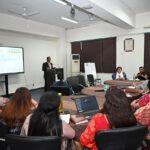On August 9, 2024, Jaipuria Institute of Management hosted a significant roundtable discussion on the “Implementation and Impact of the National Education Policy (NEP) on Higher Education.” Organized by the Institution’s Innovation Council (IIC), the event was designed to bring together faculty members for a comprehensive analysis of the NEP’s potential to transform the landscape of higher education in India.
The discussion, held in the FDP Room from 11:30 am to 01:30 pm, gathered 18 faculty members who engaged in deep conversations about the NEP’s implications for curriculum design, teaching methodologies, and the overall educational framework. The session’s primary objective was to delve into the policy’s strategic implementation within higher education institutions, exploring both the challenges and opportunities it presents.
Key Discussion Points:
Curriculum Design: The faculty discussed how the NEP emphasizes a more flexible and multidisciplinary approach to education. This shift is expected to break down traditional silos in academia, allowing students to pursue a more holistic and diverse learning experience. Faculty members exchanged ideas on how to revise existing curricula to align with NEP’s guidelines, ensuring that the education provided remains relevant in a rapidly changing world.
Teaching Methodologies: The NEP’s focus on experiential learning, critical thinking, and problem-solving skills was a major point of discussion. Faculty members explored innovative teaching methods that could be integrated into their classrooms to foster these skills. The potential of technology in enhancing teaching and learning was also a significant topic, with discussions on how digital tools can support NEP’s vision.
Interdisciplinary Learning: One of the key tenets of the NEP is promoting interdisciplinary learning. Faculty members discussed ways to create synergies between different departments and courses, enabling students to draw connections between diverse fields of study. This approach is seen as crucial in preparing students for the complexities of the global workforce.
Global Preparedness: The NEP aims to equip students with the knowledge and skills necessary to thrive in a dynamic global environment. Faculty members brainstormed on how to incorporate global perspectives into their teaching, ensuring that students are not only aware of global trends but are also prepared to contribute to them.
Learning Outcomes:
The roundtable discussion yielded several valuable insights and outcomes:
Comprehensive Understanding: Faculty members left the discussion with a deeper understanding of the NEP’s objectives and its potential to reshape higher education in India.
Actionable Strategies: Participants identified practical strategies for integrating the NEP’s guidelines into their academic practices, setting the stage for meaningful changes in the classroom.
Collaborative Environment: The discussion fostered a collaborative spirit among the faculty, allowing them to share best practices and insights on how to effectively implement the NEP.
Event Coordinators: The event was expertly coordinated by Dr. Namita Nigam, Dr. Devi, and CS Puja Shree Agarwal, whose efforts ensured a productive and insightful discussion.
In conclusion, this roundtable discussion was a critical step towards the effective implementation of the National Education Policy at Jaipuria Institute of Management. By bringing together the collective expertise of the faculty, the institution is well-positioned to navigate the changes brought about by the NEP and to continue providing high-quality, innovative education that meets the needs of the modern world.









